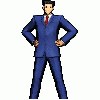
Phoenix Wright
CBUB Wins: 4
CBUB Losses: 8
CBUB Ties: 0
Win Percentage: 33.33%
Added by: Mullon
Phoenix Wright: Ace Attorney, released in Japan as , is a visual novel-type adventure video game published and developed by Capcom in Japan, North America, and Europe, and published by Nintendo in Australia. It was first released in Japan exclusively for the Game Boy Advance in 2001, and was re-released for the Nintendo DS as an enhanced remake in 2005 with touchscreen support, microphone support, and exclusive content. This version was first released in Japan, and later in North America, Europe, and Australia. The Game Boy Advance version was also re-released for the PC as Gyakuten Saiban PC, published by the Japanese company SourceNext shortly after the Nintendo DS release. A mobile phone version of the same name as the English version was released in 2009 episodically. However, only a portion of the game has been released to date. In a Famitsu scan, a series of Wii ports of the first 3 games (including the fifth case in Phoenix Wright: Ace Attorney) were announced, for releases to go between December of 2009 and March of 2010. The games will be distributed via Nintendo's WiiWare download system. The game has also been ported to the iOS with episodes 1-2 first being released in Japan on December 21, 2009 and the entire game being released in North America on May 24, 2010.
Phoenix Wright: Ace Attorney stars Phoenix Wright, a rookie defense attorney in the Fey and Co. Law Offices, owned by fellow defense attorney Mia Fey. Other characters include Maya Fey, Mia's sister; Miles Edgeworth, a rival prosecutor; Dick Gumshoe, a scatterbrained detective, and Larry Butz, an old friend of Phoenix's. The game features five court cases divided into episodes. Each case flips between two game modes: investigation and the actual trial. In the investigation aspect of the game, Phoenix gathers evidence and speaks to characters involved in the case. In the trial aspect of the game, Phoenix defends his client using said evidence, cross examines witnesses and solves the mystery surrounding each case. The court perspective is usually in the third person, while the perspective outside of court is in the first person.
Since the release of the Game Boy Advance version, the series has produced many sequels and spin-offs. Two direct sequels were produced titled Phoenix Wright: Ace Attorney Justice for All and Phoenix Wright: Ace Attorney Trials and Tribulations, which feature the same characters and gameplay as the original game and were also remade for the Nintendo DS, though without additional content. Trials and Tribulations is the last game to feature Phoenix as the protagonist. However, a new title has been released starring a new attorney called Apollo Justice titled Apollo Justice: Ace Attorney. Another spin-off has been released, titled Ace Attorney Investigations: Miles Edgeworth, which stars Miles Edgeworth and Dick Gumshoe.
Players take on the role of Phoenix Wright, who acts as a defense attorney. There are two segments: trial and investigation. During trial, players must do a variety of court tasks, including cross examining witnesses, presenting evidence, and objecting to contradictory statements or evidence presented by the prosecution. Players are given five exclamation points representing their health, which is depleted when the Judge punishes them for making a severe enough mistake. While in the first episode, players do not leave the courtroom; later episodes have the Judge put the trial on recess if something is brought up that the Judge feels the trial must be delayed so that the attorneys may look into it. On these days, players control Phoenix in the first person and investigate related areas. There are four options - Talk, which allows players to speak to anyone present; Present, which allows players to present evidence to anyone present; Examine, which allows players to search an area; and Move, which allows players to leave the area. The new episode introduced for the Nintendo DS version introduces new gameplay mechanics for the investigative portion of the game that take advantage of the DS' features. These include the luminol spray, a spray that allows people to see blood that would normally be undetectable to the naked eye and aluminum powder, which may be used to dust for fingerprints. Both use the touchscreen, while the latter uses the microphone as well. Players may also view evidence in three dimensions during this episode, which allows them to see things they would be unable to detect in two dimensions. The Nintendo DS version also introduces the ability to play the game entirely with the touch screen, the ability to view evidence and profiles on the bottom screen, and using the microphone to say various phrases in it.
Images with a green border may be set as the character's main profile image (For images 200x200 or 300x300 pixels square).
CBUB Match Record:
| Result | Opponent | My Score | Their Score | |
|---|---|---|---|---|
| Loss | Tenchi Muyo! Cast | 59 | to | 74 |
| Loss | Chrono | 37 | to | 43 |
| Win | Kazuo Kiriyama | 51 | to | 28 |
| Loss | Harvey Birdman | 45 | to | 67 |
| Loss | Doomsday | 47 | to | 61 |
| Win | Haruhi Suzumiya | 64 | to | 26 |
| Loss | Harvey Birdman | 46 | to | 63 |
| Win | Keyser Söze | 53 | to | 45 |
| Loss | Homer Simpson | 7 | to | 9 |
| Loss | Perry Mason | 10 | to | 12 |
| Win | Perry Mason | 13 | to | 5 |
| Loss | Godzilla | 1 | to | 3 |
No Fantasy Draft Records Available







